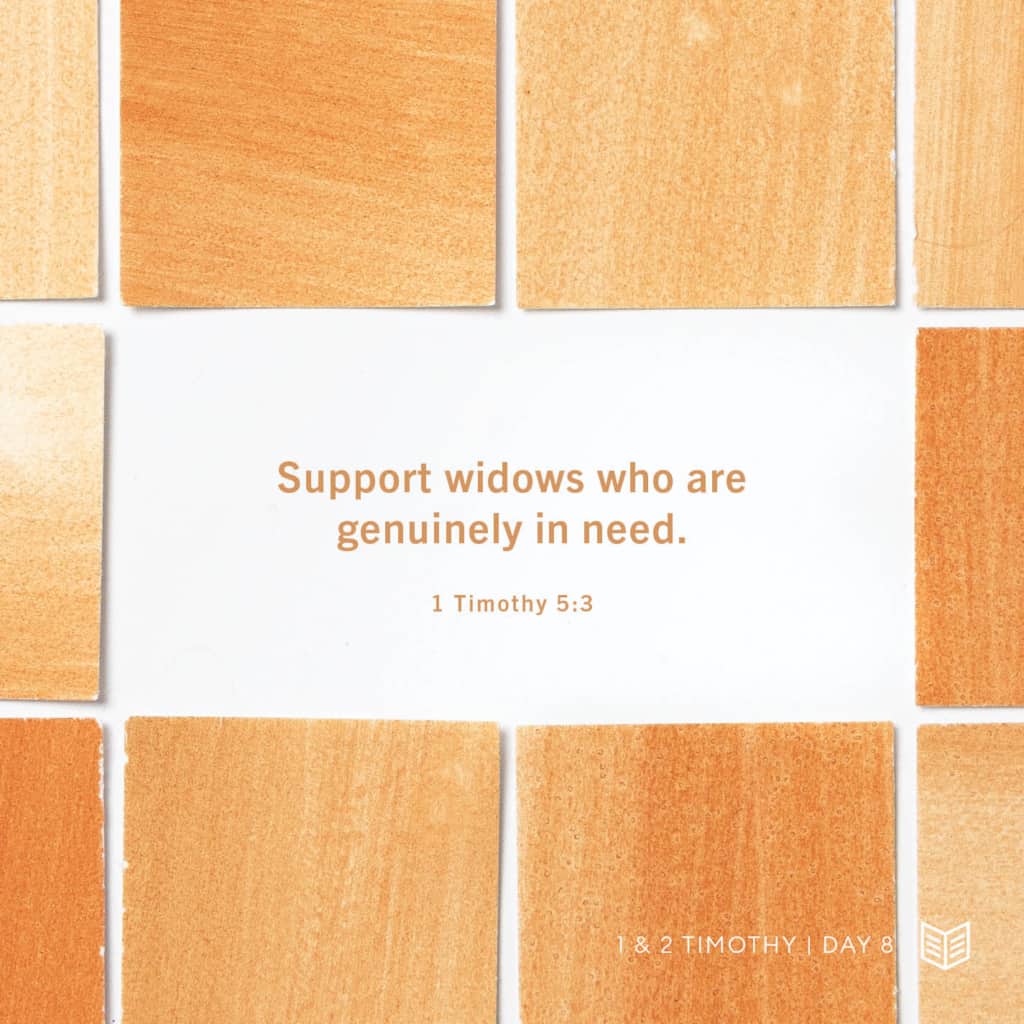I help teach a membership class at my church about once a quarter to those interested in learning more about what we believe and what it means to be a member of a local church. When you join a local church, you commit to a group of people and ask them to become your people, and you promise to become theirs. We ask our new members to stand up in front of the congregation and make that pledge to strangers and friends, people who look like them and people who don’t, people who make way more money and those who make a lot less, people that have lived many more decades and the littlest children that call our church home.
The beauty of the church is in that diversity. It’s in the equality we all share because of the work of Jesus to reconcile us all to each other and to God. And one of the most beautiful charges of the church is to love each other as a picture of how God loves us.
In 1 Timothy 5, Paul gives the young Timothy a list of helpful ways to serve the various people in his church. These are the kind but strong words of a much more experienced leader, encouraging his protégé to lead his people in love and service. Paul discusses three groups of people: church groups by age, genuine widows, and younger widows.
First, Paul tells Timothy to honor the older men as fathers, the younger men as brothers, the older women as mothers, and the younger women as sisters. What a beautiful posture of humility and kindness Paul describes here!
Second, Paul explains how the church should care for “genuine” widows, which he describes as those with no family to take care of them and those who have shown their love for God through prayer and service. We’ll unpack the distinction with “younger widows” in just a minute, but this theme of caring for widows stretches like a red thread all the way through the Bible. You can read about God’s prioritization of and care for widows in Exodus 22, Deuteronomy 24, Psalm 68, Isaiah 1, Acts 6, James 1, and more. Part of the reason for this was cultural; women whose husbands had died (particularly those without children) had no stature in society, no means for economic security, and no rights. And so God who loves the least of these always wants His people to love them too, with words and with actions.
Third, Paul reminds Timothy about “young widows” or those otherwise disqualified from the church aid, including those with families or those who wanted to remarry. This isn’t an exclusionary list of those who were or were not worthy of love or care; rather, it was a helpful instruction for a young pastor trying to establish healthy boundaries for his congregation and resources. God’s commitment to his people, all of whom are made in His image, is deeply woven throughout this text and all of Scripture.
This text reminds us what it means to be part of the family of God and part of its expression in the local church. We are bound together by a love for the Lord, and are compelled by that love to love each other in word and deed. Because of His great love for us, we are able to love fully and give freely to all in need.



I highly suggest watching The Bible Project’s video on 1 Timothy, especially in regards to today’s reading. It’s addressed at 6 minutes 18 seconds. Be blessed sisters!
Amen MERCY, your comments made me think of SEARCHING on Sunday who said regarding the verse in 2 Timothy about all scripture being God-breathed: “All Scripture, not just the parts we like or agree with”. When I find scripture difficult I am honest with the Lord and ask Him to reveal the truth in His Word. His Word is “living and active” Hebrews 4:12. It’s not meant to be easy. He calls us to put ourselves out for others, to put others before our wants or ambition.
I had the same thought! What I failed to know women then had no rights and no way of making an income.
The one value my parents tried to install in my siblings and myself is to be there for and to help family. And over the years, even after my parents passing I have found that we have been there for each other. Not only that this is a value we have tried to install in all of children. My son tries to not only look after me but his aunts on both sides of his family. My nephews and niece have been there and stepped up to help when needed. I praise God and Christ every day for parents who instilled this in us because in my over 40 years of nursing I’ve seen too many times the opposite.
Sisters be blessed and help someone today.
The Bible is always very specific with its directions in the reading today and I love it. The part that captured my interest was “do not rebuke but persuade”. Years ago when I read this chapter of 1 Timothy 5, i just remembered not to rebuke an older man, however now that I looked closer, it said older men, younger men, older women and younger women. Isn’t that almost everyone? Yes. Do not rebuke but appeal /urge /reverently encourage / respectfully persuade them with PURITY in order to maintain an appropriate relationship as if they are your family. Amen. The Word of God is truly not Paul’s opinions here. We need to discern truths from opinions, and facts from truths. And God’s word is 100% truth though written by men but God breathed. There are cultural context that can add to confusion causing debates, however I really appreciate the author’s clarification that the letter is for young pastors (Timothy at the time who was still in training to run the church), to wisely and efficiently distribute their limited resources and time. And personally I think it is wisdom for all pastors too, as churches’ resources are generally limited. To GOD be the glory, who always care for the least among us. You can really see a person’s character by how they treat the least important person (a homeless old man, a waiter, a panhandler at street corner, a janitor, the list goes on). But God’s heart is to watch out for the benefits of the least important, as how we treat the least of people, we have done it onto Him (Matthew 25:40). The heart of God is the most beautiful wonder in this whole universe. The purity and sweetness of His heart can make me weep. He is truly not from this world. Glory to HIM. Be blessed dear beautiful sisters!
Me too, Terri and Lynn more info is needed. I think I’m going to YouTube first.
There are so many excellent comments today. When we look at God’s teaching, His nudging, His ‘whispering’ it looks to me like protection, guidance and love. The analogy of the horse whisperer is perfect. The trainer knows where the danger is and that the horse’s wild reaction to fear can lead to injury. Coming just close enough to calm but not restrain allows the horse to calm himself and, in trust, be led, guided.
We tend to look at self-will and lawlessness as wild and free, but it is a dangerous place to be and can be a fearful place with no boundaries, no direction, no place of safety. The boundaries God sets are not to cage us up but rather allow us to live, trusting Him and in His protection, no matter what may come to us. That is real freedom.
OUR SUBMISSION IS A GIFT WE GIVE. It is not forced on us. Indeed it can’t be. It is a mindset. We can be beaten down or restrained, but still be rebellious. As women, as Christians, our submission is a condition of our heart to remove self from the focus of worship and put God there.
I don’t think this means that churches should not help all widows in different ways, but it seems to me that they probably had limited funds and had to give financially to those who were widows that had no families to look after them, as well as those that were a part of the church community that lived as a Christian in order that those funds were not taken advantage of by people that had other means of being cared for. Sometimes I see in churches these days people coming to get money but not caring at all about God or living for Him. Again, we should be willing to give to everyone, but I think Paul was giving specific instructions to Timothy regarding the money allotted to widows. What spoke to me deeply was that ALL of us should look after elderly people that so often get neglected or forgotten. It seems very important to God that we look after our family members personally and not just push it off on the church leaders or others to do (because each one of us actually is the church) – this can include visiting them and calling them and caring for them and showing them that they are loved and valuable. Our society seems to be often so caught up in self-indulgence that we don’t want to be inconvenienced by caring for an older person or aging relative. May the Lord fill me and all of us with His love towards them!